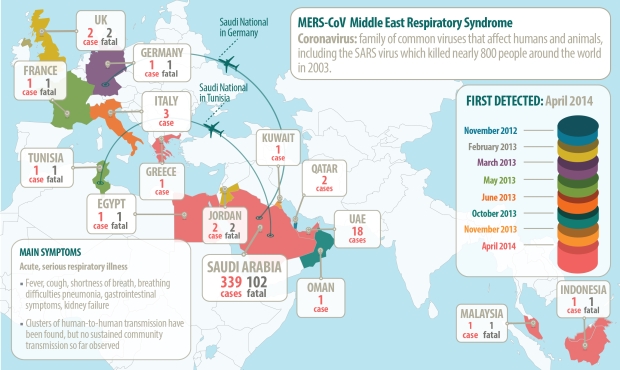Social media lift-off amid MERS panic

Anxiety about Middle East Respiratory Syndrome, the infectious virus that has now claimed over 100 lives, is spreading like wildfire on social media.
MERS, also known as coronavirus, has been the subject of huge interest, with informational videos posted throughout the day on Tuesday and over 2000 mentions an hour in Arabic tweets.
Many have been voicing concern that the numbers of infections are in fact being under-reported, and calling for the outbreak to be officially labelled an epidemic.
The virus has been noted among camel populations for over a decade, but is only considered to have crossed over into humans in 2012.
After the first known death in Saudi Arabia in June 2012, there was a lull in reported cases until the death of a Qatari national in a London hospital in June 2013.
New MEE newsletter: Jerusalem Dispatch
Sign up to get the latest insights and analysis on Israel-Palestine, alongside Turkey Unpacked and other MEE newsletters
From then until March 2013 isolated cases continued to be discovered, but the issue did not appear on the media radar.
From March on, though, the number of cases has been rising steadily, with the World Health Organisation issuing repeated warnings to member states to take effective preventive measures.
In the past month MERS has attracted a flurry of coverage, not least since the diagnosis of cases in Malaysia, Egypt and the Philippines.
In Saudi Arabia alone, April 2014 has seen 183 diagnoses of the virus, which represents a 73% spike in the number of infections for this month.
Now, with professionals concerned at the possible international trajectory of MERS, Saudi Arabian officials have been taking visible steps to counter its spread.
After the resignation of four doctors at Jeddah’s King Fahd Hospital, King Abdullah travelled to the city last week, to “prove that the exaggerated and false rumours about coronavirus are not true.”
The Saudi health ministry confirmed this Tuesday that camels are the most common source of the virus, and warned at-risk groups to stay away from camel milk and meat.
However, in a statement published on Saturday the WHO reported that over three quarters of cases are now transmitted from human to human.
The majority of new diagnoses are now among healthcare professionals, and some have wondered whether staying away from camels, the primary carriers, will be an effective measure.
The WHO also warned that “transmissibility” of the virus from human to human may have increased, and that until preventive measures are implemented, more cases are likely.
WHO doctors will arrive in Saudi Arabia on Wednesday in “response to a request for assistance from the Saudi government.”
Though the Saudi reaction to MERS has elicited praise from some quarters, it would seem that concerned citizens are putting in place their own preventive measures.
There have been reports of businessmen refusing to shake hands, and of waiters at the high-end Jeddah restaurant al-Nakheel donning protective face-masks when dealing with diners.
It appears that people have also been turning to practitioners of traditional medicine, after reports that doctors have been demanding down-payments before agreeing to treat affected patients.
On Monday the Saudi health ministry issued a strongly-worded warning, declaring that purveyors of “folk medicine” were operating without a licence, and had no power to offer medical assistance.
Observers are now wondering what other measures might be taken to prevent further spread of the virus.
Dr Christopher Davidson, reader in Middle East Politics at Durham University, told MEE that he feared “mass camel executions”, especially in the lead-up to the annual hajj pilgrimage in October.
It is expected that other at-risk states will take steps to prevent infection within their borders, with Egyptian authorities reporting on Monday that they have begun a programme of “testing and tracking” of travellers returning from the Gulf via air and sea ports.
These measures will doubtless prove costly, especially given that the WHO demanded that member states “maintain vigilance”.
Middle East Eye delivers independent and unrivalled coverage and analysis of the Middle East, North Africa and beyond. To learn more about republishing this content and the associated fees, please fill out this form. More about MEE can be found here.


